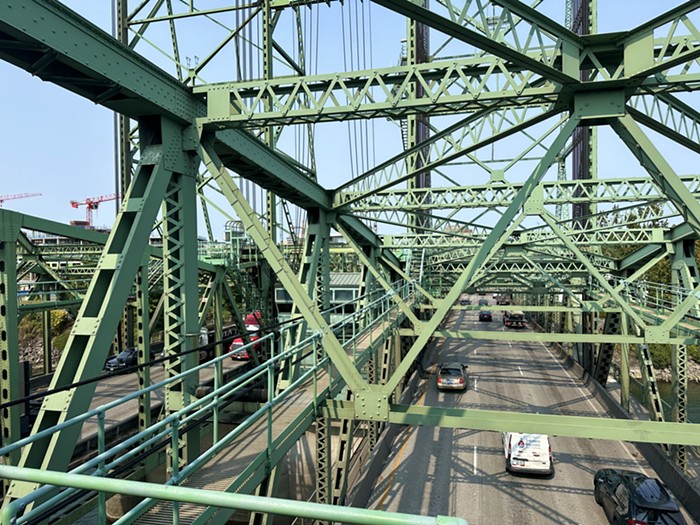
Multnomah County Circuit Judge Karin Immergut this morning took up a challenge from state fuel lobbyists seeking to alter the language voters will see on the ballot. Then she swatted most of that challenge aside.
Oregon Fuels Association President Paul Romain has sworn to combat the four-year, 10-cent-per-gallon local gas tax Portland City Council referred to the May 17 ballot in January. The first step to that, as with most ballot opposition campaigns: Make the gas tax look as unappetizing as possible when voters peruse their ballots.
In a challenge [pdf] filed last month, Romain argued for a number of changes to the language Portland City Attorney's office had crafted under state rules around ballot language. One of the largest contentions: That it's improper for the city to include specific projects in a summary of the gas tax's effects. That summary reads:
Measure creates program dedicated to street repair, traffic safety through
temporary, ten-cents per gallon tax on motor vehicle fuels in Portland for
vehicles not subject to weight-mile tax, estimated to raise $64 million over
four years. Tax implemented no earlier than September 2016, expires in four
years. Establishes license requirements.Project categories with examples in each category:
• Street repair, ($35.8 million)- Parts of SE Foster, N Denver, NE Alberta
• Safe Routes to Schools, ($8 .8 million) - Lent Elementary traffic calming,
David Douglas HS sidewalks, George Middle School crossings
• Sidewalk completion, ($6.4 million)- SW Capitol Highway, NE 14th
• High Crash Corridor safety improvements, ($3.9 million) -lighting on
SE Powell, crosswalk improvements on NE Sandy, 82nd Avenue, SW
Beaverton/Hillsdale Highway
• Reducing bicycle I car conflicts, ($5.6 million)- two Neighborhood
Greenways in East Portland, safer bicycle routes downtown
• Intersection safety improvements, ($3 .4 million) - focused on improving
access to transit: NE MLK, US 30Citizen oversight committee reviews expenditures, provides annual reports. Audits
required.
In his challenge, and again in court this morning, Romain noted that no language in the gas tax—expected to raise $64 million over four years—would specifically require the city to fund those projects. City leaders could change their whims at any time, he said.
"It can be used for a number of other things," he said. "Putting in a list is very, very prejudicial."
Deputy City Attorney Linly Rees argued those uses would essentially be set in stone by virtue of going before voters. And she said that the laundry list could turn off voters who don't see improvements they want.
"By including specific projects, you are cutting both ways," she said.
The other big argument this morning was that the ballot language obscures a major fact of the gas tax: That the heavy trucks doing most damage to the streets wouldn't have to pay. The ballot language currently only includes an oblique mention of that exemption, saying that the tax applies to "vehicles not subject to weight-mile tax..." That's a reference to the state tax assigned to trucks that weigh more than 26,000 pounds, and Romain argued this morning that people should know that.
"If you simply say 'weight-mile exemption,' no one but transportation nuts understands what that is," Romain said. "Those trucks are going to be in effect using the roads, but not paying this tax." It was an interesting argument to hear from Romain, who represents the Portland truck stops the truck exemption was designed to protect.
Rees, who oddly couldn't explain the reason for the diesel exemption, said Romain's preferred verbiage of "heavy truck" was just as opaque. "Your average person doesn’t know what a heavy truck is," she said.
Romain repeatedly suggested it was unfair that the City of Portland gets to craft supposedly impartial ballot language for a measure it supports. He called Immergut a "neutral arbitrator," asking her to "change good to better."
But the judge didn't see the need for changes. She left the city's language untouched, apart from axing a sentence in the city-provided explanatory statement she felt toed the line of partisan campaigning. That sentence was a version of something we've all heard Transportation Commissioner Steve Novick say dozens of times, as failed street fee suggestion begat failed street fee suggestion begat, eventually, the current gas tax proposal.
It read: "Street investments now save money later."


















